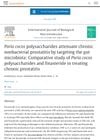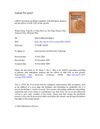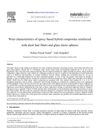 38 citations,
January 2016 in “Cell Death and Disease”
38 citations,
January 2016 in “Cell Death and Disease” The TCL1 transgenic mouse model is useful for understanding human B-cell leukemia and testing new treatments.
[object Object]  37 citations,
September 2018 in “Psychoneuroendocrinology”
37 citations,
September 2018 in “Psychoneuroendocrinology” Finasteride treatment in male rats causes long-lasting effects on depression-like behavior, brain cell growth, inflammation, and gut bacteria composition.
23 citations,
July 2020 in “Aging Cell” Aging changes sugar molecules on skin stem cells, which may affect their ability to repair skin.
20 citations,
January 1995 in “Cells tissues organs” Changing light periods synchronized wool growth cycles in sheep.
18 citations,
February 2020 in “Journal of pharmaceutical and biomedical analysis” The method accurately measures hormones and endocannabinoids in mice, showing gut microbiota diversity affects these levels and may influence stress and reproductive systems.
 18 citations,
August 2019 in “Nutrients”
18 citations,
August 2019 in “Nutrients” Eating barley for life may lead to healthier aging in mice.
 17 citations,
September 2020 in “Journal of Endocrinological Investigation”
17 citations,
September 2020 in “Journal of Endocrinological Investigation” Post-finasteride patients show changes in gut bacteria, possibly causing various symptoms.
 16 citations,
January 2021 in “Dermatology and therapy”
16 citations,
January 2021 in “Dermatology and therapy” An imbalance in gut bacteria is linked to skin immune diseases and may affect their outcomes and related health issues.
 13 citations,
June 2007 in “Journal of Dermatological Science”
13 citations,
June 2007 in “Journal of Dermatological Science” Researchers created a cell line to study hair growth and found specific genes affected by dihydrotestosterone.
 12 citations,
August 2021 in “International Journal of Biological Macromolecules”
12 citations,
August 2021 in “International Journal of Biological Macromolecules” Poria cocos polysaccharides and finasteride both help treat chronic nonbacterial prostatitis, but Poria cocos polysaccharides also improve gut health.
11 citations,
November 2021 in “International journal of molecular sciences” Gut microbes significantly affect brain steroid levels.
 10 citations,
June 2016 in “Wound Repair and Regeneration”
10 citations,
June 2016 in “Wound Repair and Regeneration” The microenvironment, especially mechanical forces, plays a crucial role in hair growth and could lead to new treatments for hair loss.
 10 citations,
December 2020 in “Experimental and Molecular Pathology”
10 citations,
December 2020 in “Experimental and Molecular Pathology” miR-133b promotes hair growth and could be a potential treatment for hair loss.
10 citations,
July 2013 in “International Journal of Research in Pharmaceutical Sciences” The herbal microemulsion was safe and more effective at controlling hair loss than a standard product.
 9 citations,
November 2018 in “Journal of cosmetic dermatology”
9 citations,
November 2018 in “Journal of cosmetic dermatology” Orobanche rapum extract rejuvenates skin and protects skin bacteria, leading to healthier skin.
 9 citations,
February 2022 in “Genes”
9 citations,
February 2022 in “Genes” Women with PCOS have more Bifidobacterium in their gut compared to those without PCOS.
9 citations,
January 2013 in “BioMed research international” The conclusion suggests a new acne treatment that controls bacteria by reducing water in the skin's pores using sugar-like substances.
 8 citations,
October 2022 in “Cold Spring Harbor perspectives in biology”
8 citations,
October 2022 in “Cold Spring Harbor perspectives in biology” The document concludes that better understanding the wound microbiome can improve chronic wound care by preserving helpful bacteria and targeting harmful ones.
 8 citations,
March 2017 in “Experimental Dermatology”
8 citations,
March 2017 in “Experimental Dermatology” Finasteride helps female-pattern hair loss.
 7 citations,
January 2018 in “Materials Today: Proceedings”
7 citations,
January 2018 in “Materials Today: Proceedings” Adding human hair fibers and glass micro-spheres to epoxy improves its wear resistance and strength.
[object Object]  6 citations,
May 2022 in “Frontiers in Microbiology”
6 citations,
May 2022 in “Frontiers in Microbiology” Marine microbes could be used in cosmetics for sun protection, skin care, and possibly preventing hair loss.
 5 citations,
April 2024 in “bioRxiv (Cold Spring Harbor Laboratory)”
5 citations,
April 2024 in “bioRxiv (Cold Spring Harbor Laboratory)” Aging skin shows thinner layers, fewer hair follicles, and new biomarkers like increased space between cells and smaller sebaceous glands.
 5 citations,
October 2022 in “Phenomics”
5 citations,
October 2022 in “Phenomics” Your skin is like an ecosystem, with its own community of microbes and substances that interact and affect its health.
 5 citations,
April 2023 in “BMC Microbiology”
5 citations,
April 2023 in “BMC Microbiology” Shampoo with heat-killed Lacticaseibacillus paracasei GMNL-653 improves scalp health and hair growth by changing scalp bacteria.
5 citations,
September 2022 in “Frontiers in Nutrition” Gut bacteria differences may help diagnose and treat Alopecia areata.
4 citations,
October 2021 in “Microorganisms” Men with androgenetic alopecia have different scalp oils and microbes compared to those without.
 4 citations,
August 2020 in “Applied Materials Today”
4 citations,
August 2020 in “Applied Materials Today” Hydrogel microcapsules help create cells that boost hair growth.
 4 citations,
January 2015 in “Journal of microbial & biochemical technology”
4 citations,
January 2015 in “Journal of microbial & biochemical technology” Biotin helps regulate proteins in the blood, which may explain its role in hair growth.
3 citations,
September 2021 in “Annals of Plastic Surgery” Oxygenated micro/nanobubbles speed up burn wound healing in rats.
 3 citations,
October 2019 in “Pharmaceutics”
3 citations,
October 2019 in “Pharmaceutics” New technique implants pigment in scalp with less pain and damage.




















